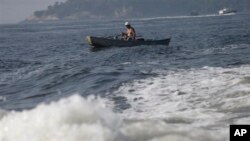The summit on protecting the world’s oceans ended Friday, with a call to tackle the major threats of climate change, overfishing, habitat loss and pollution. The Global Oceans Action Summit for Blue Growth and Food Security was held in The Hague.
A joint initiative on ocean health was announced by the Netherlands -- the summit host country -- the U.N. Food and Agriculture Organization, the World Bank and summit organizers.
Valerie Hickey of the World Bank said the summit was a success.
“I think this was the first time that over 600 people came together to align agendas across the conservation and growth fields to discuss how can we actually commit to action to support broad-based blue growth, food security. This was about making sure that we can invest in the oceans in a way that alleviates poverty, that shares broad prosperity, while turning down the heat.”
Hickey, World Bank’s sector manager for agriculture and environmental services, said broad agreement was possible at the oceans summit -- unlike many summits on climate change.
“This was the Global Oceans Action Summit. This was not an inter-government where we were negotiating text. This was an opportunity for the over 80 ministers, leaders from the private sector and civil society to sit down together and make commitments to real action in real time. This was an opportunity to take our hats off – to not speak simply from government positions – to move beyond our positions and start talking about real commitments in real time,” she said.
She said that agreement was reached on a three part approach to protecting the oceans. The first would set-up partnerships.
“We need to bring in the private sector. We need to increase our investments in small and medium size enterprises. Because at the end of the day it’s local communities – it’s family fishers – it’s small-scale fishers – who are going to drive broad-based blue growth in the ocean space. We also talked about governance. We talked about the fact that we need to accelerate action to make sure we can eliminate illegal, unregulated and unreported fishing,” said Hickey.
The third part of the strategy, she said, calls for financing from new places and new partners to support blue growth programs. Hickey says she’s confident these recommendations will move from commitment to action.
“Absolutely,” she said, “I can say personally that we, as the World Bank, are committed to following up on the actions that we promised to do after the summit. It includes helping countries to undertake natural capital accounting of their ocean resources so they can begin to realize real returns from their ocean assets in a sustainable way – in a broad-based way – that returns benefits to those local communities and small-scale fishers, who rely for food security for their livelihoods – for their income – on the oceans.”
Also commenting on the outcome of the oceans summit was Netherlands Agriculture Minister Sharon Dijksma, chair of the summit. She says, “The world community has shown courage and boldness to move ahead and take action on ocean health and food security.”
A joint initiative on ocean health was announced by the Netherlands -- the summit host country -- the U.N. Food and Agriculture Organization, the World Bank and summit organizers.
Valerie Hickey of the World Bank said the summit was a success.
“I think this was the first time that over 600 people came together to align agendas across the conservation and growth fields to discuss how can we actually commit to action to support broad-based blue growth, food security. This was about making sure that we can invest in the oceans in a way that alleviates poverty, that shares broad prosperity, while turning down the heat.”
Hickey, World Bank’s sector manager for agriculture and environmental services, said broad agreement was possible at the oceans summit -- unlike many summits on climate change.
“This was the Global Oceans Action Summit. This was not an inter-government where we were negotiating text. This was an opportunity for the over 80 ministers, leaders from the private sector and civil society to sit down together and make commitments to real action in real time. This was an opportunity to take our hats off – to not speak simply from government positions – to move beyond our positions and start talking about real commitments in real time,” she said.
She said that agreement was reached on a three part approach to protecting the oceans. The first would set-up partnerships.
“We need to bring in the private sector. We need to increase our investments in small and medium size enterprises. Because at the end of the day it’s local communities – it’s family fishers – it’s small-scale fishers – who are going to drive broad-based blue growth in the ocean space. We also talked about governance. We talked about the fact that we need to accelerate action to make sure we can eliminate illegal, unregulated and unreported fishing,” said Hickey.
The third part of the strategy, she said, calls for financing from new places and new partners to support blue growth programs. Hickey says she’s confident these recommendations will move from commitment to action.
“Absolutely,” she said, “I can say personally that we, as the World Bank, are committed to following up on the actions that we promised to do after the summit. It includes helping countries to undertake natural capital accounting of their ocean resources so they can begin to realize real returns from their ocean assets in a sustainable way – in a broad-based way – that returns benefits to those local communities and small-scale fishers, who rely for food security for their livelihoods – for their income – on the oceans.”
Also commenting on the outcome of the oceans summit was Netherlands Agriculture Minister Sharon Dijksma, chair of the summit. She says, “The world community has shown courage and boldness to move ahead and take action on ocean health and food security.”





